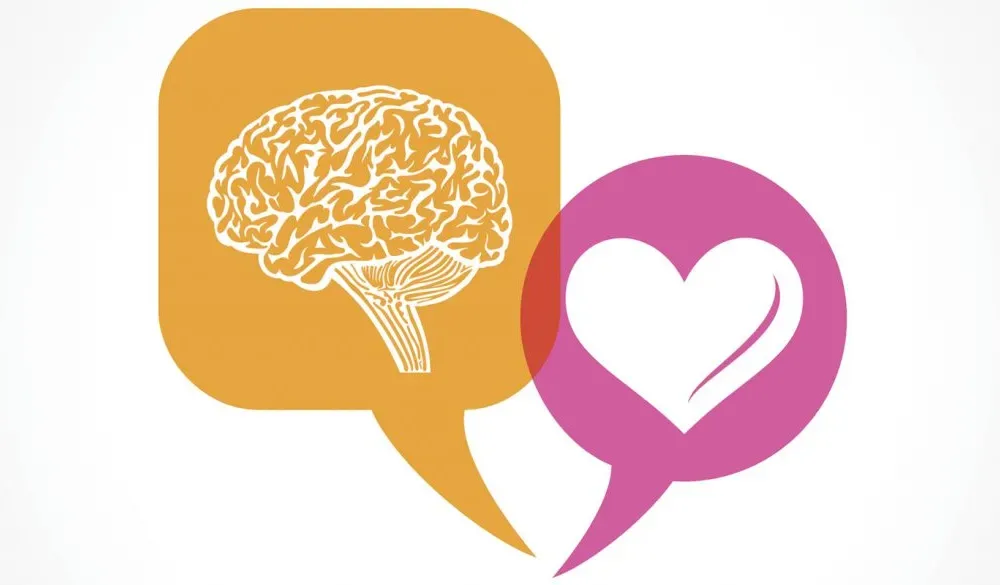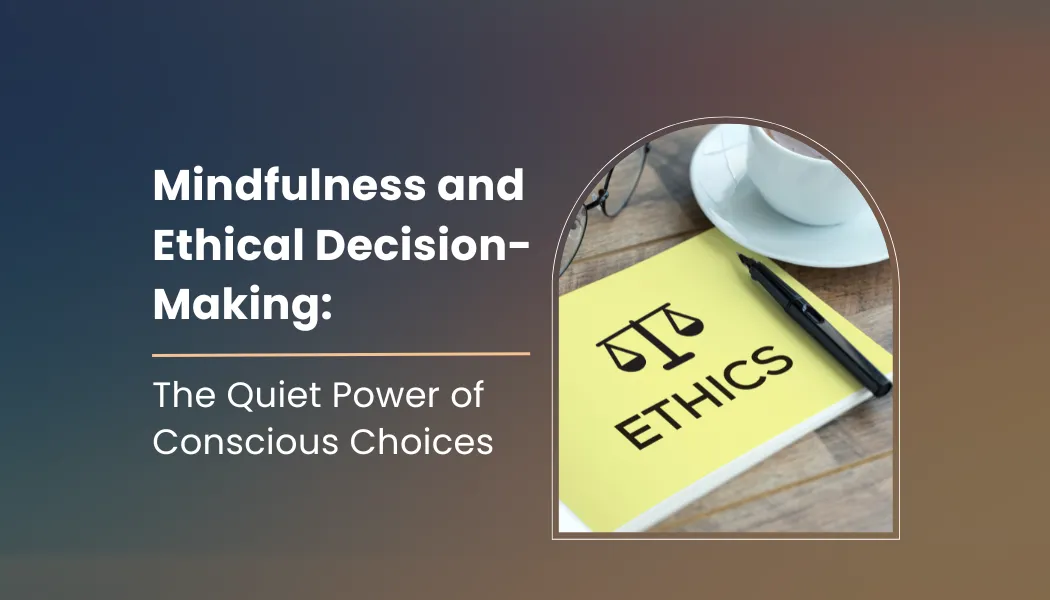Mindfulness and Ethical Decision-Making: The Quiet Power of Conscious Choices
In a fast-moving world filled with instant messages, endless to-do lists, and constant notifications, we often find ourselves reacting instead of reflecting. We make decisions — big and small — almost on autopilot. But in doing so, we sometimes overlook something deeply important: the ethics of our choices.
In a fast-moving world filled with instant messages, endless to-do lists, and constant notifications, we often find ourselves reacting instead of reflecting. We make decisions — big and small — almost on autopilot. But in doing so, we sometimes overlook something deeply important: the ethics of our choices.
Mindfulness, the simple yet profound act of paying attention to the present moment without judgment, can transform the way we make decisions. It helps us slow down, breathe, and consider not only what we are doing but also why we are doing it. In that pause lies the seed of ethical awareness — a space where compassion, clarity, and responsibility can grow.
This article explores how mindfulness shapes ethical decision-making, why it’s crucial in both personal and professional life, and how anyone can cultivate this skill to live and lead with greater integrity.
Table of contents
- 1. Understanding Mindfulness Beyond the Buzzword
- 2. The Link Between Mindfulness and Ethics
- 3. Why Ethical Decisions Are Hard in Modern Life
- 4. The Neuroscience Behind Mindful Ethics
- 5. How Mindfulness Enhances Ethical Awareness
- 6. Mindfulness in Professional Ethics
- 7. Everyday Scenarios: How Mindfulness Guides Ethical Choices
- 8. Cultivating Mindfulness for Ethical Decision-Making
- 9. The Ripple Effect of Mindful Ethics
- 10. Mindfulness, Ethics, and the Heart of Humanity
- 11. When It’s Hard to Be Mindful
- 12. A Mindful World: The Bigger Vision
- 13. Final Reflection: The Compass Within
1. Understanding Mindfulness Beyond the Buzzword
Mindfulness is not just a stress-management technique or a passing wellness trend. Its roots run deep — originating in ancient contemplative traditions such as Buddhism, where it was seen as a path toward awareness, compassion, and right action.
In modern psychology, mindfulness has been redefined as “paying attention, on purpose, in the present moment, and non-judgmentally.” This means tuning in to your inner world — your thoughts, emotions, and sensations — and your outer world — your surroundings and interactions — without trying to immediately change or escape them.
When we are mindful, we are fully awake to life. Instead of rushing through decisions driven by fear, ego, or impulse, we engage with the moment consciously. And that consciousness naturally leads to more ethical awareness — because awareness and morality are deeply connected.
2. The Link Between Mindfulness and Ethics
Ethical decision-making is about choosing actions that are aligned with your values and that promote the well-being of others. It’s easy to think of ethics as a matter of logic or rules — right versus wrong — but in practice, our ethical compass is shaped by emotions, culture, and unconscious biases.
Here’s where mindfulness changes the game.
When we’re mindful, we notice our emotions without being overwhelmed by them. We recognize our biases instead of being ruled by them. We create the mental space to ask, “Is this choice consistent with my values? Will it cause harm? Does it reflect kindness and integrity?”
Mindfulness activates regions of the brain associated with empathy and self-regulation, allowing us to respond to moral dilemmas with balance rather than reactivity. It connects awareness with action — helping us make decisions that are not only smart but also kind and just.
3. Why Ethical Decisions Are Hard in Modern Life
Ethical decision-making can be incredibly complex. Modern life presents us with conflicting interests — deadlines versus honesty, ambition versus fairness, personal gain versus collective good. The world rarely gives us clear black-and-white options.
We live in a world that rewards speed and results. Leaders are pushed to make quick calls, employees are measured by productivity, and individuals are often pressured to “win” even if it comes at a cost to others. Under stress, our nervous systems shift into survival mode — fight, flight, or freeze. In this state, we become reactive, short-sighted, and emotionally defensive.
Mindfulness helps us step out of this cycle.
Instead of reacting from fear or pressure, we respond from awareness. We can pause and ask ourselves:
- “Am I making this choice because it’s right or because it’s convenient?”
- “How might my actions affect others — not just now, but later?”
- “Does this align with who I want to be?”
This self-inquiry is the heart of ethical mindfulness.
4. The Neuroscience Behind Mindful Ethics
Science gives us fascinating insights into how mindfulness supports ethical decision-making.
When we practice mindfulness, areas of the brain such as the prefrontal cortex (responsible for reasoning and empathy) become more active, while the amygdala (responsible for fear and impulse) becomes less reactive. This neurological balance helps us regulate emotions and consider long-term consequences instead of making rash, self-serving decisions.
Moreover, mindfulness strengthens our ability to recognize ethical blind spots — the subtle justifications we use when making questionable choices (“everyone does it,” “it’s not a big deal,” “no one will notice”). By cultivating self-awareness, we begin to see these rationalizations for what they are: mental shortcuts that protect comfort, not integrity.
In short, mindfulness literally rewires the brain for moral clarity.
5. How Mindfulness Enhances Ethical Awareness
Let’s explore how mindfulness contributes directly to ethical thinking and behavior:
a. Clarity of Perception
Mindfulness clears mental fog. When we’re aware of our own biases, emotions, and motives, we can perceive situations more accurately. Clear perception reduces misunderstanding and unethical shortcuts.
b. Emotional Regulation
Strong emotions — anger, greed, fear — often drive unethical acts. Mindfulness allows us to observe these emotions without letting them take control. We learn to respond calmly rather than lash out impulsively.
c. Compassion and Empathy
True mindfulness cultivates compassion — not only for oneself but also for others. When we recognize our shared humanity, we are less likely to harm others and more inclined to act with fairness and care.
d. Moral Courage
Being mindful doesn’t mean being passive. It often means standing firm in difficult moments. Awareness gives us the courage to speak truthfully, admit mistakes, or resist unethical pressure.
e. Accountability
A mindful person takes responsibility for their actions. They reflect regularly on their choices, acknowledge errors, and strive to make amends. Ethics and mindfulness meet in this space of humble accountability.
6. Mindfulness in Professional Ethics
a. Leadership
Mindful leaders make decisions grounded in awareness rather than ego. They listen deeply, balance multiple perspectives, and act with transparency. Research shows that mindful leaders create more ethical, innovative, and psychologically safe workplaces.
b. Business and Corporate Responsibility
In business, ethical mindfulness is crucial. It means considering not only profit but also people and the planet. Companies led by mindful decision-makers often prioritize sustainability, fair labor practices, and honest communication — building long-term trust with employees and customers.
c. Healthcare and Education
Doctors, nurses, teachers, and counselors constantly face ethical dilemmas. Mindfulness helps them stay centered amid stress and make compassionate, balanced choices. A mindful doctor listens better; a mindful teacher fosters inclusion and respect.
d. Technology and AI
In today’s digital age, ethical mindfulness matters more than ever. The creators of technology hold immense power to shape human behavior. Mindful developers and policymakers think deeply about privacy, equity, and long-term impact — ensuring technology serves humanity, not the other way around.
7. Everyday Scenarios: How Mindfulness Guides Ethical Choices
Let’s make this real with a few examples:

Scenario 1: The White Lie
You’re tempted to lie to a friend to avoid hurting their feelings. A moment of mindfulness helps you pause and ask: “Is this kindness or avoidance?”
You might choose to tell the truth gently — valuing honesty and respect.
Scenario 2: The Workplace Shortcut
You notice a mistake on a report right before a deadline. You could ignore it and hope no one notices — or you could stay late to fix it.
Mindfulness helps you connect to your integrity, reminding you that ethical excellence builds trust that shortcuts never can.
Scenario 3: The Online Comment
You see a post that makes you angry. Before typing a harsh response, you breathe. You notice the surge of emotion and decide to respond thoughtfully or not at all.
That simple pause prevents harm — and reinforces your capacity for self-control and compassion.
Scenario 4: The Consumer Choice
At the store, you choose between a cheaper fast-fashion shirt and a sustainable one. A mindful moment makes you reflect on the unseen labor behind each product. You decide to support ethical production — aligning your purchase with your principles.
In each case, mindfulness doesn’t dictate what to do — it helps you see clearly enough to choose wisely.
8. Cultivating Mindfulness for Ethical Decision-Making
Building mindfulness isn’t about escaping the world; it’s about engaging with it more consciously. Here are practical ways to develop this connection between awareness and ethics:
1. Start with Breath Awareness
Even a few minutes of mindful breathing can shift you from reactivity to reflection. Pause before big decisions. Inhale deeply, exhale slowly, and reconnect with your values.
2. Practice the “Ethical Pause”
Before acting, ask:
- Is this true?
- Is it kind?
- Is it necessary?
- What impact will this have?
This simple pause can prevent unethical impulses born from stress or habit.
3. Reflect Daily
Spend a few moments at the end of each day to review your actions. Where did you act with integrity? Where could you do better? This builds moral awareness over time.
4. Listen Mindfully
When others speak, listen fully — not just to respond but to understand. Ethical decisions often depend on understanding perspectives beyond your own.
5. Cultivate Compassion
Engage in loving-kindness meditation or simple acts of generosity. Compassion softens judgment and inspires ethical care for others.
6. Bring Mindfulness into Teams
Encourage mindful communication in workplaces, classrooms, and families. When people feel heard and respected, ethical collaboration naturally flourishes.
9. The Ripple Effect of Mindful Ethics
When one person practices mindfulness, it might seem small — like a drop in a pond. But that drop creates ripples. Mindful individuals inspire ethical workplaces, compassionate families, and caring communities.
Imagine a world where leaders paused before making profit-driven decisions, where employees spoke up with honesty, and where communities resolved conflicts with awareness rather than anger. That world begins with individual mindfulness.
Ethical living is not about being perfect; it’s about being present. It’s choosing to come back, again and again, to awareness and integrity — even when it’s hard.
10. Mindfulness, Ethics, and the Heart of Humanity
At its deepest level, mindfulness connects us to something universal: our shared humanity. When we become aware of our breath, we are reminded that everyone breathes the same air, carries similar hopes, and suffers similar fears. From that realization comes empathy, and from empathy comes ethics.

The Dalai Lama once said, “Be kind whenever possible. It is always possible.”
Mindfulness helps us remember that kindness is always an option — even in moments of conflict or confusion. It helps us see that ethical decision-making is not just about following rules; it’s about cultivating the quality of our hearts.
Every mindful choice — to tell the truth, to help rather than harm, to listen instead of judge — strengthens the moral fabric of our lives.
11. When It’s Hard to Be Mindful
Let’s be honest: mindfulness isn’t easy. When emotions run high or when stakes are heavy, staying centered can feel almost impossible. But that’s precisely when mindfulness is most needed.
If you find yourself overwhelmed:
- Pause. Even a few seconds of conscious breathing matters.
- Name what you feel — “anger,” “fear,” “confusion.” Naming softens intensity.
- Ask: “What choice would I be proud of tomorrow?”
That one mindful question can guide you toward ethical clarity, even in chaos.
12. A Mindful World: The Bigger Vision
Imagine if mindfulness were taught in every school and practiced in every boardroom. Imagine newsrooms guided by awareness, healthcare shaped by compassion, and governments that paused before acting to reflect on human dignity and justice.
This isn’t idealistic — it’s possible.
It begins with individual practice, spreads through mindful leadership, and eventually becomes cultural wisdom. A mindful society is one that values fairness, honesty, and care — not because it must, but because it chooses to.
13. Final Reflection: The Compass Within
Mindfulness doesn’t give us all the answers, but it gives us the space to find them. It brings us back to what truly matters — awareness, compassion, and ethical intention.
When we act from that space, our decisions stop being just choices; they become expressions of our deepest values. They ripple outward, shaping a world that is not only smarter but kinder, not only efficient but ethical.
The truth is, every decision — big or small — is an opportunity to practice mindfulness.
Every moment is a chance to act with integrity.
And sometimes, all it takes to begin is a single breath — and the quiet courage to pause.
Clarity, Integrity & Choices That Align With Your Values
Ethical decisions become clearer when the mind is calm, aware, and connected to intention. These thoughtful reads explore how mindfulness strengthens judgment, reduces impulsive reactions, and deepens your understanding of what truly matters:
• Mindfulness and Social Responsibility: Navigating Ethical Considerations in Personal Growth — Discover how mindful awareness can guide you toward choices that reflect compassion, fairness, and responsibility.
• Awareness After Anger: How Mindfulness Helps You Recover — Learn how emotional clarity supports better, more grounded decision-making—even in moments of tension.
• Mindfulness of Letting Go: Not Everything Needs Holding — Explore how releasing attachment and old patterns creates space for wiser, more intentional choices.
Want Words That Encourage Wise and Calm Decisions?
Explore Words of Encouragement — Uplifting reminders that support clarity, courage, and thoughtful action.
The Positivity Collective
The Positivity Collective is a dedicated group of curators and seekers committed to the art of evidence-based optimism. We believe that perspective is a skill, and our mission is to filter through the noise to bring you the most empowering wisdom for a vibrant life. While we are not clinical professionals, we are lifelong students of human growth, devoted to building this sanctuary for the world.
